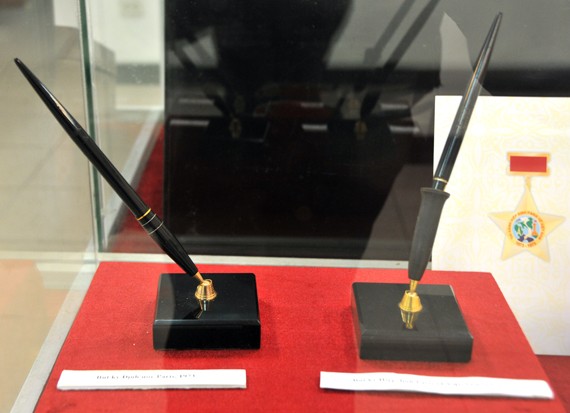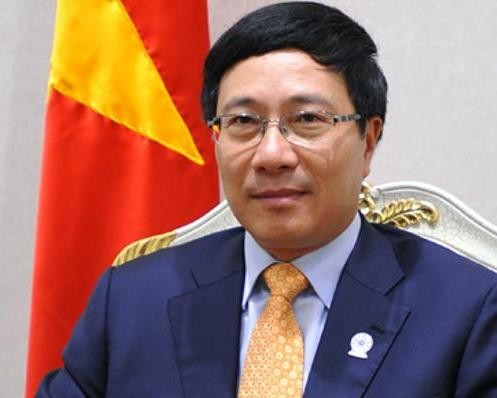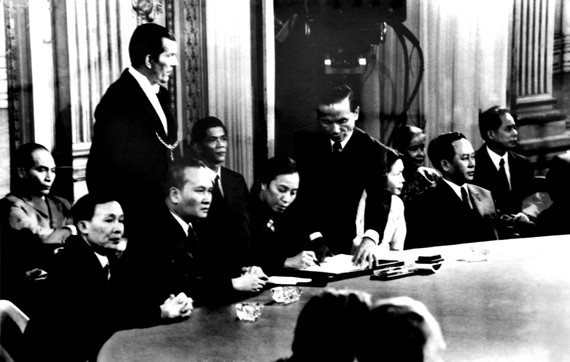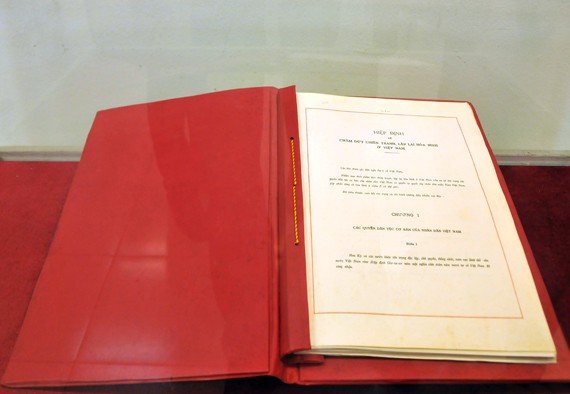(VOVworld)- The Paris Peace Accords on ending the war and restoring peace to Vietnam signed on January 27, 40 years ago was a Vietnamese people’s historic victory in the anti-US national struggle. Under the agreement, the US recognized Vietnam’s independence, sovereignty, unification and territorial integrity and withdrew all US and ally troops out of southern Vietnam. This agreement created a prerequisite for Vietnam’s great victory in Spring 1975 that totally liberated the country.
 |
The 1973 Paris Peace Accords was signed in Paris by the governments of the Democratic Republic of Vietnam, the Vietnam Southern Liberation Front (later became the provisional revolutionary government of the Republic of Southern Vietnam), the US and the Republic of Vietnam. The agreement was the outcome of a long negotiation that lasted for 4 years, 8 months, and 14 days with more than 200 public sessions and 24 private meetings. Foreign Minister Pham Binh Minh says the Paris negotiation and the Paris Peace Accords were Vietnam’s combined victory in its struggle in military, politics and diplomacy. Foreign Minister Minh says: “The negotiation in Paris was a long, challenging but glorious struggle of Vietnam’s diplomacy under the Party leadership. The decision to pursue the strategy of fighting and negotiation at the same time, the policies during public and secret meetings, and the contents of the Paris Peace Accords reflect the justice of Vietnam’s national liberation struggle. The Paris Peace Accords is also the first international legal document that forced the US to respect Vietnam’s independence, sovereignty and unification”.

Foreign Minister Pham Binh Minh
|
Signing the Paris agreement, Vietnam achieved its goal of expelling the US and moved forward to overthrow the Saigon Puppet Regime thus creating a prerequisite to totally liberate the south and unify the country in 1975. Trinh Ngoc Thai, a member of the Democratic Republic of Vietnam’s delegation at the Paris Conference says: “The Paris negotiation on Vietnam drew the attention of the world public because the political, military and diplomatic struggle between Vietnam and the US was the focus of the world’s disputes at that time. The signing of the Paris Peace Accords brought an end to the fiercest and longest war in the world after World War II”.
 |
The Paris negotiation was a tense fight of nerves between two diplomacies: the US power based diplomacy and Vietnam’s humanity-based diplomacy. Ngyen Thi Binh, former Vice President, Head of the negotiation delegation of the Provisional Government of the Republic of Southern Vietnam said Vietnam successfully applied the diplomatic motto of “Using stability to respond to instability” in this negotiation. “Regarding to the Paris negotiation, it was the unchangeable principle for the US to end its war in southern Vietnam. Accordingly, the US must withdraw out of Vietnam unconditionally to ensure independence, sovereignty and territorial integrity for Vietnam. We always maintained such a stable stance. We also flexibly responded to real situation. At the beginning, we aimed to solve the military and political issues at the same time. But, depending on the situation and our position at different periods, we made appropriate decision. If it was favorable, we moved further to solve other issues”, said Ms Binh.

1973 Paris Peace Accords
|
The Paris Peace Accord was also of great international significance as it contributed to the national liberation cause of Lao and Cambodian people. The agreement also opened a new era for the political arena in Southeast Asia: the US withdrew its troops out of Indochina and Southeast Asia, and the neutral parties developed strongly in the region opening up opportunities to establish a region of peace, friendship and stability.
The Paris agreement showed Vietnam’s success in taking advantage of the former Soviet Union, China, socialist and Non-Aligned countries and American peace advocates to set up a front of world’s support for Vietnam’s anti-US struggle. This also reflected the success of the motto of combining the national strength with that of the world, and the state diplomacy with people’s diplomacy. Mr. Trinh Ngoc Thai says: “In history of national struggles, none but the one in Vietnam could set up a movement- a front uniting the world’s support for Vietnam. There was also an anti-US war movement in the US. The world public’s strength became pressures on the US invasion policy and an encouragement for Vietnamese people”.
The Paris conference left behind several important lessons, including those on strong will in defending the national independence, sovereignty and the international solidarity. These lessons still retain their practical importance until today. 40 years have passed, the values of the 1973 Paris Peace Accord are the significant milestones in Vietnam’s diplomacy in HCM era.